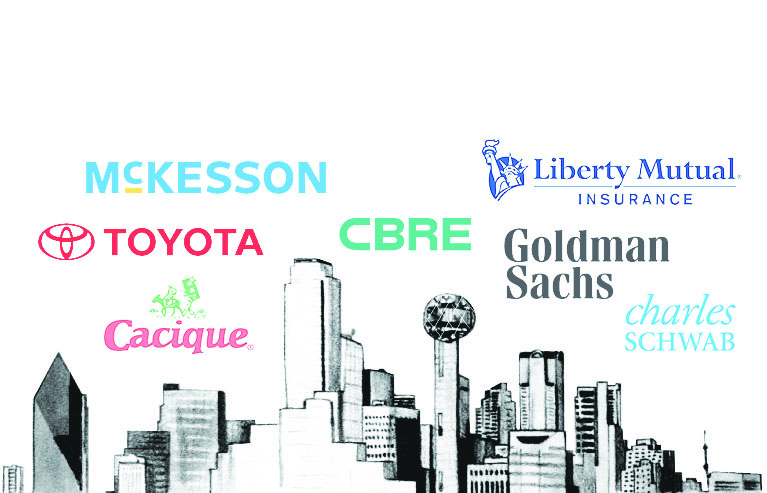Over the past decade, an increasing number of multinational corporations have moved their headquarters into the Dallas/Fort Worth (DFW) area.
DFW’s central location, high quality of living and pro-business environment have quickly gained notice around the country, making the metroplex a desirable location to live and work.
The surge of relocations is not confined to just one specific industry — companies in a multitude of sectors are intent on establishing themselves in DFW to join the growing number of businesses that have made the region home.
One of the dozens of corporations that has relocated to the metroplex over the last several years is McKesson, a global healthcare company that distributes pharmaceuticals as well as other medical goods, services and information.
Ranked as the largest Fortune 500 company in DFW after ExxonMobil’s relocation to Houston, McKesson now operates out of Irving, Texas, having moved from San Francisco nearly five years ago.
For CEO Brian Tyler, one of the primary factors in the decision to relocate was the talent pool of qualified workers available in the metroplex.
The robust, competitive labor market in DFW provides the high level talent McKesson needs to fill their positions.
According to the Texas Tribune, last fall, the U.S. Department of Health and Human Services named Dallas a national hub for medical innovation. McKesson and other industry leaders in the metroplex appreciate this distinction, as it will bring more healthcare specific talent to the region, bolstering the already strong talent pool.
Even hiring workers from across the country has become easier for McKesson after their move to the metroplex.
“It was very difficult to attract people to relocate to San Francisco,” Tyler said. “We have found it much easier to recruit people to Dallas.”
DFW’s location in the heart of the country has also been a positive for both Tyler and McKesson. While in San Francisco, traveling across the country was often a burden.
“I can’t tell you how many six hour flights I’ve been on across the country to the east coast to visit customers or manufacturer partners,” Tyler said.
But now, due to DFW’s central location, two international airports and position at the junction of interstate highways, traveling to any corner of the country has become easier, allowing Tyler to be more efficient with his business travel and save valuable time.
Another key factor in McKesson’s decision to move to DFW is the regulatory framework in place in Texas. Known for its pro-business environment, Texas does not have a corporate or personal income tax at the state level, making the state an attractive destination for national corporations.
The cost of living here is also generally more affordable than other large cities across the country. For McKesson, moving to DFW allows employees to live a more affordable lifestyle.
In addition to affordable living is the area’s versatile framework, which Cullum Clark ‘85, Director of the Bush Institute at SMU’s Economic Growth Initiative, believes to be another major component of the incentive for companies to relocate.
“It’s not only lower cost,” Clark said, “It’s also that the Dallas Fort Worth area has a diverse economy that makes it a really good place to do business.”
This diverse economy encompasses a wide variety of communities that residents can live in. From Uptown to the Park Cities to the suburbs, DFW offers a plethora of neighborhoods for individuals to choose from to join companies.
Beyond the logistical aspects of relocating, Tyler is grateful for the hospitable nature of the metroplex, which has made the move and transition particularly streamlined.
“I’ve lived in 10 or 12 different cities with McKesson over the years and by far Dallas was the most welcoming to me personally, but also just to our whole business in general,” Tyler said.
He believes that this welcoming, pro-business environment will continue to attract corporations for years to come.
“I do see it as a bit of a virtuous cycle,” Tyler said. “The more companies come here, the bigger the talent pool gets, the more attractive it becomes to have a business here. I think as long as those fundamentals stay in place, Texas is going to continue to grow.”
Clark also believes that the influx of business still has not reached its full potential.
“I think there’s tremendous momentum,” Clark said. “The factors that have driven this enormous movement of companies into North Texas are very strong. So there’s no reason to think that suddenly that movement would stop on a dime.”
But the large wave of companies reveals obstacles that might put pressure on DFW’s continued development. Although Clark believes that these challenges are manageable, people should be wary of consequences and strive to solve problems at hand.
“When you have lots of growth, you have questions about rising traffic and increased competition for well-located real estate, which can drive up home prices,” Clark said. “That presents a challenge for people who are trying to buy their first home. Increased population also puts a strain on infrastructure, power infrastructure and water supplies.”
But for Tyler, looking back on the decision to relocate, he knows McKesson made the right choice.
“I often get asked, you know, well, what would you do if you could do it over again? What would you do differently?” Tyler said. “And the thing I say is, I would have gone 10 years earlier.”







